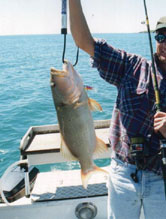So what's wrong with fish?
by David Ogilvie
Fish and pain
The scientific literature is quite clear. Anatomically, physiologically and biologically, the pain system in fish is virtually the same as in birds and mammals. ...in animal welfare terms, you have to put fishing in the same category as hunting.
- Dr Donald Broom, Professor of Animal Welfare, Cambridge University.
It is unthinkable that fish do not have pain receptors; they need them in order to survive.
- Professor Frank Hird, microbiologist, Melbourne University.
 |
While fish cannot always express pain and suffering in ways that humans can easily recognise, biologists and scientists tell us that fish are capable of feeling pain. Fish may not be cute and cuddly like puppies and kittens, but they suffer and experience pain in very much the same way. Fish suffer from being impaled, crushed, or mutilated while alive, and they are often left to die slowly and painfully of suffocation.
Their behaviour should be evidence enough of their suffering: their heart rate and breathing rate increases, adrenaline is released, they gasp, struggle, and writhe, endeavouring to escape and, by so doing, also demonstrate they have a will to survive. Scientific studies substantiate these basic realities and, thereby, underscore that suffering is inherent in the catching and killing of fish.
|
It has been shown that fish (like other vertebrate animals, including humans) have a highly developed system that may help protect them from severe pain - pain which could endanger their lives if they were seriously handicapped by it following some injury to their bodies, such as might be inflicted by a large predator. This system releases natural opiate-like substances (enkephalins and endorphins) once an animal is injured. ... The presence of this pain-dampening opiate system implies that there must be some capacity to experience pain, otherwise there would be little point in animals having evolved such a system in the first place. (6)
In a key 1996 report examining the welfare of farmed fish, the UK Ministry of Agriculture's official advisory body, the Farm Animal Welfare Council, noted the following:
'Almost all fish live the whole of their lives in water and show a maximal emergency response when removed from water, even for a very short period. This response includes changes in heart rate, increased production of adrenaline, noradrenaline and cortisol and vigorous muscle contractions...' These changes 'often indicate fear in the fish... All of the scientific evidence concerning such effects makes it clear that the term stress is certainly relevant to fish and that the means by which stress effects are mediated are very similar to those in mammals. Evidence that the term pain is applicable to fish comes from anatomical, physiological and behavioural studies whose results are very similar to those of studies on birds and mammals. The fact that fish are cold blooded does not prevent them from having a pain system and, indeed, such a system is valuable in preserving life and maximising the biological fitness of individuals. The receptor cells, neuronal pathways and specialised transmitter substances in the pain system are very similar in fish to those in mammals.' (7)
Fish and intelligence
Fish generally have a reputation of being the instinct-driven 'dimwits' of the animal kingdom. A group of British scientists has recently concluded, however, that fish are actually cunning, manipulative, cultured and socially aware.
The three scientists, who work with the universities of Edinburgh and St Andrew's in Scotland, and the University of Leeds, said conceptions of the psychological and mental abilities of fish had undergone a "sea change" in the past few years.
The biologists wrote in the journal Fish and Fisheries: "Gone (or at least obsolete) is the image of fish as drudging and dimwitted pea brains, driven largely by 'instinct', with what little behavioural flexibility they possess being severely hampered by an infamous 'three-second memory'.
"Now fish are regarded as steeped in social intelligence, pursuing Machiavellian strategies of manipulation, punishment and reconciliation, exhibiting stable cultural traditions, and cooperating to inspect predators and catch food."
Recent research has shown that fish not only recognise individual 'shoal mates' but monitored the social prestige of others, and tracked relationships.
They had also been observed using tools, building complex nests and bowers, and exhibiting impressive long-term memories.
The scientists added: "Although it may seem extraordinary to those comfortably used to pre-judging animal intelligence on the basis of brain volume, in some cognitive domains, fishes can even be favourably compared to non-human primates."
They said that there were 27,000 known species of fish, and that there had been "ample time" for fish to evolve complex, adaptable and diverse behaviour patterns that rivalled those of other vertebrates.
"These developments warrant a re-appraisal of the behavioural flexibility of fishes and highlight the need for a understanding of the learning processes that underpin the newly recognised behavioural and social sophistication of this taxon," said the scientists. (8) |

